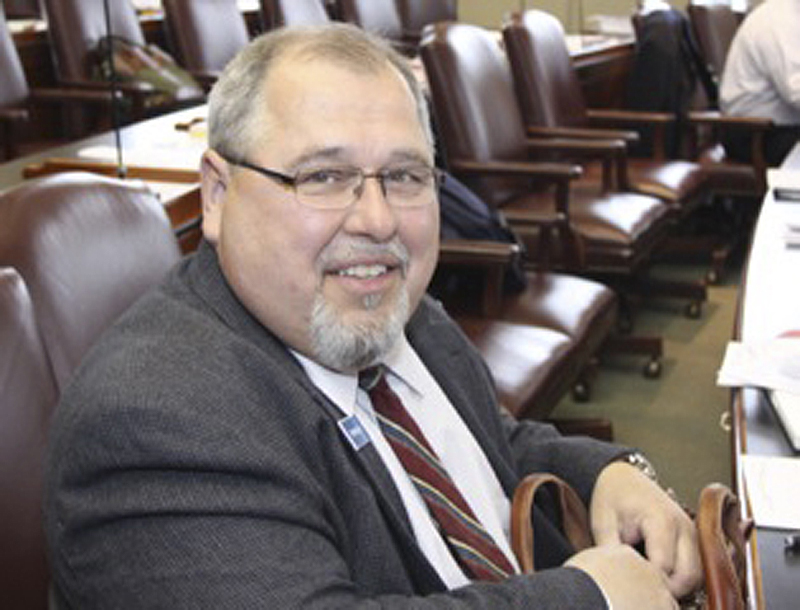A bill that would create a pilot program to help a few police agencies start heroin diversion programs is only a promising first step, the bill’s author says.
“I don’t pretend my bill has the answer,” said Rep. Mark Dion, D-Portland. “A crisis requires that we make meaningful budget decisions to meet the challenge.”
Data released Wednesday shows that heroin overdose deaths in Maine through the first nine months of this year have eclipsed the number of deaths for all of 2014 – 71 through Sept. 30 compared with 57 in 2014, according to the state Attorney General’s Office.
Dion’s bill, which will be considered in January, would provide a total of $2 million for up to eight police departments to start diversion programs, similar to a program that Portland is creating to provide treatment options for users in lieu of arrests.
Dion said his proposal doesn’t comprehensively address the state’s heroin problem, and that he believes that a Medicaid expansion would provide a substantial infusion of new money into the state that would help thousands get into treatment programs.
Dion – like Democratic leaders and two moderate Republicans in the state Senate – is advocating for Medicaid expansion as a way to pump millions into the state to fund health insurance for low-income residents, which also would help addicts who currently can’t get into programs find viable treatment options for substance abuse.
Medicaid clients have an easier time enrolling in treatment programs than the uninsured because substance abuse counselors can be reimbursed for patients who have Medicaid, while the uninsured typically rely on programs to take them for free.
Gov. Paul LePage – a staunch opponent of Medicaid expansion – lambasted efforts by moderate Republican Sens. Roger Katz of Augusta and Tom Saviello of Wilton to craft a compromise bill that would be more palatable to conservatives, calling it unaffordable. The two senators have been selling the measure as a way to alleviate the state’s heroin epidemic.
“Two liberal politicians want to expand Medicaid again, shamelessly tying it to more treatment programs for addicts. We already spend $76 million a year on substance abuse programs, but only $3 million a year chasing drug traffickers from out-of-state gangs,” LePage said Tuesday in his weekly radio address.
Saviello said Wednesday that despite the governor’s criticism, he has been receiving “extremely positive reaction” to his bill to expand Medicaid to more than 60,000 Mainers, but he hasn’t yet started lobbying his fellow Republican lawmakers.
“We are sitting on an opportunity, on a potential funding source,” Saviello said. “I think the door is open to make this happen.” The federal government pays 100 percent of Medicaid expansion through 2016, gradually decreasing the federal share to 90 percent by 2020.
Details of Saviello’s bill have yet to be unveiled, but he has said it’s similar to compromise plans in other states under Republican control or with divided government – including Montana, Arkansas, Iowa and New Hampshire. The state would seek a waiver from the Obama administration to offer Affordable Care Act insurance to people who earn up to 138 percent of the federal poverty level.
LePage has said such an expansion is unaffordable, and he pointed to other states that have seen huge Medicaid enrollment increases after Medicaid was expanded, putting pressure on their budgets.
LePage said that in Maine, which has tightened Medicaid eligibility and seen an overall decrease in people receiving Medicaid, from 355,000 in 2011 to 287,000 this year, the Medicaid budget is under control.
“(The Maine Department of Health and Human Services) has done a tremendous job of containing the Medicaid shortfalls that used to blow holes in the budget every year. Medicaid spending is now essentially flat,” LePage said.
LePage and other Republicans opposed to expansion also have doubted the Obama administration’s pledge that funding would not fall below 90 percent in subsequent years.
Scarborough Police Officer John Gill, who coordinates Operation HOPE, a program that connects addicts seeking help who walk into the Police Department with treatment resources, said Medicaid expansion would go a long way toward removing hurdles his department is experiencing in placing people in treatment programs.
He said about two-thirds of the nearly 90 people who have been helped are uninsured, and they’ve been forced to go to out-of-state treatment programs, typically ones that have a few slots dedicated to free care.
“There’s very little treatment capacity in the state of Maine,” Gill said. “It’s getting harder and harder for us to do these placements, and we don’t have any competition right now.”
But Gill said with Medicaid expansion, treatment programs would spring up within Maine because there would be a financial incentive. Nearly everyone seeking help through Operation HOPE would be able to get into programs because the substance abuse counselors would be reimbursed for providing care, he said.
Brendan Melican, public relations manager for Spectrum Health Systems, a Massachusetts-based nonprofit that closed its clinic in Sanford this year because of funding problems caused by the state’s Medicaid program, said it would consider returning to Maine if Medicaid expansion and a reasonable reimbursement model were approved.
“Absolutely, we would consider it. We would re-evaluate,” Melican said. “The heroin problem is real in our region. It’s going to get worse before it gets better.”
Send questions/comments to the editors.




Success. Please wait for the page to reload. If the page does not reload within 5 seconds, please refresh the page.
Enter your email and password to access comments.
Hi, to comment on stories you must . This profile is in addition to your subscription and website login.
Already have a commenting profile? .
Invalid username/password.
Please check your email to confirm and complete your registration.
Only subscribers are eligible to post comments. Please subscribe or login first for digital access. Here’s why.
Use the form below to reset your password. When you've submitted your account email, we will send an email with a reset code.